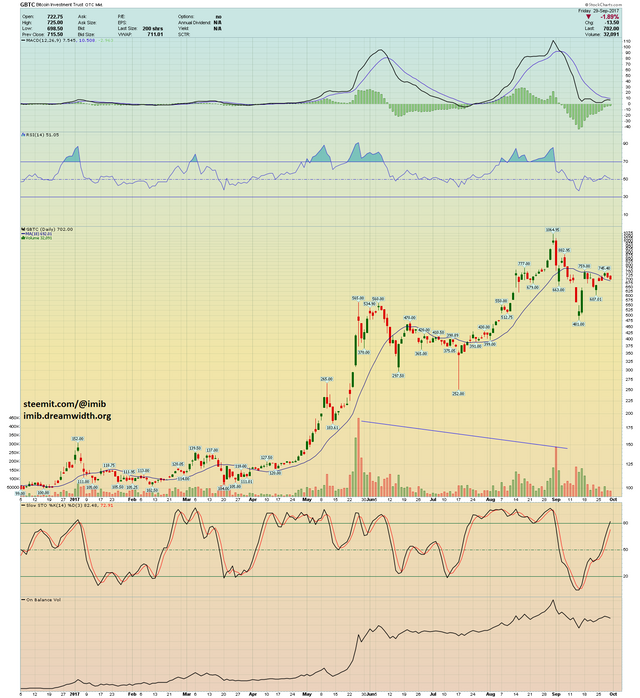IMF chief Christine Lagarde tells central bankers to not dismiss Bitcoin
Christine Lagarde, the head of the International Monetary Fund, has a message for the world's central bankers: Don't be Luddites.
Addressing a conference in London on Friday, Lagarde said virtual currencies, which are created and exchanged without the involvement of banks or government, could in time be embraced by countries with unstable currencies or weak domestic institutions. "In many ways, virtual currencies might just give existing currencies and monetary policy a run for their money," she said. "The best response by central bankers is to continue running effective monetary policy, while being open to fresh ideas and new demands, as economies evolve."
Here are the relevant parts of her paper:
Let us start with virtual currencies. To be clear, this is not about digital payments in existing currencies—through Paypal and other “e-money” providers such as Alipay in China, or M-Pesa in Kenya.Virtual currencies are in a different category, because they provide their own unit of account and payment systems. These systems allow for peer-to-peer transactions without central clearinghouses, without central banks.For now, virtual currencies such as Bitcoin pose little or no challenge to the existing order of fiat currencies and central banks. Why? Because they are too volatile, too risky, too energy intensive, and because the underlying technologies are not yet scalable. Many are too opaque for regulators; and some have been hacked.But many of these are technological challenges that could be addressed over time. Not so long ago, some experts argued that personal computers would never be adopted, and that tablets would only be used as expensive coffee trays. So I think it may not be wise to dismiss virtual currencies.
Better value for money?
For instance, think of countries with weak institutions and unstable national currencies. Instead of adopting the currency of another country—such as the U.S. dollar—some of these economies might see a growing use of virtual currencies. Call it dollarization 2.0.IMF experience shows that there is a tipping point beyond which coordination around a new currency is exponential. In the Seychelles, for example, dollarization jumped from 20 percent in 2006 to 60 percent in 2008.And yet, why might citizens hold virtual currencies rather than physical dollars, euros, or sterling? Because it may one day be easier and safer than obtaining paper bills, especially in remote regions. And because virtual currencies could actually become more stable.For instance, they could be issued one-for-one for dollars, or a stable basket of currencies. Issuance could be fully transparent, governed by a credible, pre-defined rule, an algorithm that can be monitored…or even a “smart rule” that might reflect changing macroeconomic circumstances.So in many ways, virtual currencies might just give existing currencies and monetary policy a run for their money. The best response by central bankers is to continue running effective monetary policy, while being open to fresh ideas and new demands, as economies evolve.
Better payment services?
For example, consider the growing demand for new payment services in countries where the shared, decentralized service economy is taking off.This is an economy rooted in peer-to-peer transactions, in frequent, small-value payments, often across borders.Four dollars for gardening tips from a lady in New Zealand, three euros for an expert translation of a Japanese poem, and 80 pence for a virtual rendering of historic Fleet Street: these payments can be made with credit cards and other forms of e-money. But the charges are relatively high for small-value transactions, especially across borders.Instead, citizens may one day prefer virtual currencies, since they potentially offer the same cost and convenience as cash—no settlement risks, no clearing delays, no central registration, no intermediary to check accounts and identities. If privately issued virtual currencies remain risky and unstable, citizens may even call on central banks to provide digital forms of legal tender.So, when the new service economy comes knocking on the Bank of England’s door, will you welcome it inside? Offer it tea—and financial liquidity?
New models of financial intermediation
This brings us to the second leg of our pod journey—new models of financial intermediation.One possibility is the break-up, or unbundling, of banking services. In the future, we might keep minimal balances for payment services on electronic wallets.The remaining balances may be kept in mutual funds, or invested in peer-to-peer lending platforms with an edge in big data and artificial intelligence for automatic credit scoring.This is a world of six-month product development cycles and constant updates, primarily of software, with a huge premium on simple user-interfaces and trusted security. A world where data is king. A world of many new players without imposing branch offices.Some would argue that this puts a question mark on the fractional banking model we know today, if there are fewer bank deposits and money flows into the economy through new channels.
How would monetary policy be set in this context?
Today’s central banks typically affect asset prices through primary dealers, or big banks, to which they provide liquidity at fixed prices—so-called open-market operations. But if these banks were to become less relevant in the new financial world, and demand for central bank balances were to diminish, could monetary policy transmission remain as effective?
By Christine Lagarde, IMF Managing Director
Bank of England conference, London
BTW Goldman Sachs is exploring how it could help clients trade bitcoin and other digital currencies, according to a person briefed on the plan.
The New York-based bank is in talks with cryptocurrency experts but hasn’t yet formulated a business plan, a timetable for implementation or made any bitcoin-related investments, according to the person who asked not to be identified talking about internal deliberations. Among the questions the bank is seeking to answer: how to address know-your-customer requirements and how to understand the risks of the volatile currency, the person said: “In response to client interest in digital currencies, we are exploring how best to serve them in the space,” Tiffany Galvin, a spokeswoman for the New York-based bank, said in a statement without elaborating.
Goldman Sachs’s approach differs from that of JPMorgan Chase & Co. Chief Executive Officer Jamie Dimon, who said last month that bitcoin is a fraud and that he would fire any employee trading it for being “stupid.”
Goldman Sachs is further along with the blockchain technology that underlies bitcoin, and has invested in a startup, Axoni, that is working to bring distributed-ledger technology to financial firms.
The Wall Street Journal reported Goldman Sachs’s efforts earlier Monday.
So what we’ll see in the next few years is the decentralization of information.
But what we see today is that business owners and consumers are increasingly becoming concerned with privacy / security / hacking and large companies consolidating data and power.
Should we concerned that Google knows everything about you?
They track what you write to people, what you browse on the internet, and even where you go as you walk around with your Android phone. Facebook, too, knows so much about you. In fact, some even suggest that they monitor so much data to know which startups are up and coming and try to copy them. B2B companies are also consolidating. Salesforce and Oracle are both acquiring companies like crazy and will soon know everything about how you run your business on all fronts.
But even if you’re not concerned about the powerful companies who are consolidating your data, there’s also been a rise in concern about whether they can even keep your data safe. The rise in hacking and data exposure has both consumers and businesses nervous. It’s clear that many companies are not able to keep your information safe. Even companies whose job is security are not able to store your information well! This is a total mindshift.
I wanted to focus this post on the reasons for why blockchain and tokens are so widely talked about. Because so many tech investors and entrepreneurs today are not thinking about the fundamental problems that blockchain and tokens are solving. And much like the 90s, I’m now seeing so many ideas involving both blockchain and new tokens just for the sake of using them but not to solve actual problems. These, of course, are my predictions and I think the Era of Decrentalization is here to stay for a while and will have big impact on so many industries.
Comments / thoughts very welcome!
P.S.
Follow, Resteem and VOTE UP @imib

Congratulations @imib! You have completed some achievement on Steemit and have been rewarded with new badge(s) :
Click on any badge to view your own Board of Honor on SteemitBoard.
For more information about SteemitBoard, click here
If you no longer want to receive notifications, reply to this comment with the word
STOPCongratulations @imib! You have completed some achievement on Steemit and have been rewarded with new badge(s) :
Click on any badge to view your own Board of Honor on SteemitBoard.
For more information about SteemitBoard, click here
If you no longer want to receive notifications, reply to this comment with the word
STOP@minnowpond1 has voted on behalf of @minnowpond. If you would like to recieve upvotes from minnowpond on all your posts, simply FOLLOW @minnowpond. To be Resteemed to 4k+ followers and upvoted heavier send 0.25SBD to @minnowpond with your posts url as the memo
Основной сценарий в силе - движение в район 2500 без обновления хаёв (5000). Если же обновление хаёв случится, то это будет ещё одна возможность продать биток.
Однако думаю, что обновления верхов не будет.
Падение объемов указывает на то, что наибольший объем уже был на этих уровнях + дивергенция на осцилляторе.
Фонд, инвестирующий в биткойн демонстрирует худшую динамику, чем сама криптовалюта. Что тоже, косвенно указывает на медвежий фактор пары Bitcoin/USD.

@cmtzco has voted on behalf of @minnowpond. If you would like to recieve upvotes from minnowpond on all your posts, simply FOLLOW @minnowpond. To be Resteemed to 4k+ followers and upvoted heavier send 0.25SBD to @minnowpond with your posts url as the memo